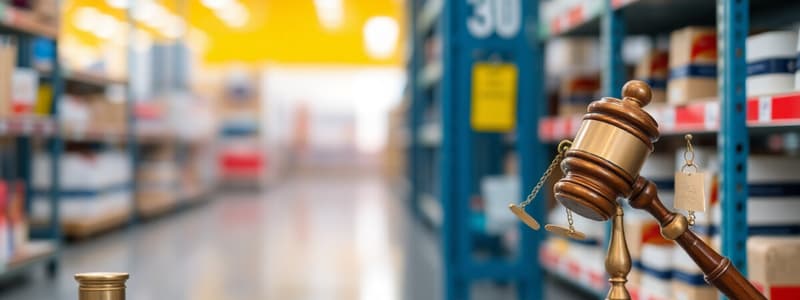Podcast
Questions and Answers
What type of laws require companies to disclose information about the safety or fees of their financial products?
What type of laws require companies to disclose information about the safety or fees of their financial products?
- Laws guaranteeing consumer access
- Laws regulating advertising standards
- Laws prohibiting specified sales practices
- Laws requiring product information disclosure (correct)
Which of the following is NOT a type of consumer protection measure discussed?
Which of the following is NOT a type of consumer protection measure discussed?
- Access to personal finance information
- Labeling of food ingredients
- Class actions for consumers
- Guaranteed insurance against all losses (correct)
What is the purpose of laws prohibiting specified sales practices?
What is the purpose of laws prohibiting specified sales practices?
- To ensure transparency in financial markets
- To promote competitive pricing for services
- To allow companies full discretion in contract terms
- To protect consumers from unfair contractual terms (correct)
Which of the following best describes class actions in the context of consumer protection?
Which of the following best describes class actions in the context of consumer protection?
Which law requires businesses to provide consumers access to their personal financial information?
Which law requires businesses to provide consumers access to their personal financial information?
In which regions is a manufacturer likely to face liability for injuries caused by defective products?
In which regions is a manufacturer likely to face liability for injuries caused by defective products?
What does the term 'caveat vendor' imply?
What does the term 'caveat vendor' imply?
What traditionally was the rule regarding seller liability under contract obligations?
What traditionally was the rule regarding seller liability under contract obligations?
What has been the general trend in product liability laws in recent decades?
What has been the general trend in product liability laws in recent decades?
Which of the following best defines 'tort' in common law systems?
Which of the following best defines 'tort' in common law systems?
Which statement reflects a significant change in consumer protection laws?
Which statement reflects a significant change in consumer protection laws?
What is the primary responsibility of companies regarding product safety under modern law?
What is the primary responsibility of companies regarding product safety under modern law?
Why might a manufacturer in Mumbai be held liable for injuries caused by their televisions sold abroad?
Why might a manufacturer in Mumbai be held liable for injuries caused by their televisions sold abroad?
What is one basis of liability that can apply to manufacturers regardless of negligence?
What is one basis of liability that can apply to manufacturers regardless of negligence?
Which legal system primarily relies on strict liability as a basis for product liability?
Which legal system primarily relies on strict liability as a basis for product liability?
What defense claims that the injured consumer contributed to their own injury?
What defense claims that the injured consumer contributed to their own injury?
What argument might absolve a manufacturer from liability if the product usage was inherently risky?
What argument might absolve a manufacturer from liability if the product usage was inherently risky?
In which scenario might a manufacturer be held liable even without evidence of direct negligence?
In which scenario might a manufacturer be held liable even without evidence of direct negligence?
How might governments promote consumer protection in contracts?
How might governments promote consumer protection in contracts?
What element is NOT typically part of fraud as per common law?
What element is NOT typically part of fraud as per common law?
Which of the following reflects a government action against misleading consumers?
Which of the following reflects a government action against misleading consumers?
If a product cannot be made safer, what defense might be valid?
If a product cannot be made safer, what defense might be valid?
What could be a shared liability in a market setting?
What could be a shared liability in a market setting?
Which of the following is an increasing trend in consumer protection?
Which of the following is an increasing trend in consumer protection?
What can be an outcome of 'contributory negligence' for a business entity?
What can be an outcome of 'contributory negligence' for a business entity?
What reflects globalization's impact on consumer protection?
What reflects globalization's impact on consumer protection?
Which of the following statements is true regarding manufacturer liability?
Which of the following statements is true regarding manufacturer liability?
Flashcards
Product Liability
Product Liability
A company's legal responsibility for injuries caused by defective products they manufacture or sell.
Defective Product
Defective Product
A product with a flaw that causes harm or injury during normal use.
Caveat Emptor
Caveat Emptor
A principle that holds the buyer responsible for inspecting goods for defects.
Caveat Vendor
Caveat Vendor
Signup and view all the flashcards
Tort
Tort
Signup and view all the flashcards
Contract Obligation
Contract Obligation
Signup and view all the flashcards
Tort Obligation
Tort Obligation
Signup and view all the flashcards
Ordinary Care
Ordinary Care
Signup and view all the flashcards
Consumer Disclosure Laws
Consumer Disclosure Laws
Signup and view all the flashcards
Prohibited Sales Practices
Prohibited Sales Practices
Signup and view all the flashcards
Access to Financial Information
Access to Financial Information
Signup and view all the flashcards
What are 'class action' lawsuits?
What are 'class action' lawsuits?
Signup and view all the flashcards
Consumer Protection
Consumer Protection
Signup and view all the flashcards
Negligence (Product Liability)
Negligence (Product Liability)
Signup and view all the flashcards
Strict Liability
Strict Liability
Signup and view all the flashcards
Contributory Negligence
Contributory Negligence
Signup and view all the flashcards
Assumption of Risk
Assumption of Risk
Signup and view all the flashcards
Defenses (Product Liability)
Defenses (Product Liability)
Signup and view all the flashcards
Consumer Protection Laws
Consumer Protection Laws
Signup and view all the flashcards
Fairness Requirements (Contracts)
Fairness Requirements (Contracts)
Signup and view all the flashcards
Deception (Consumer)
Deception (Consumer)
Signup and view all the flashcards
Fraud (Consumer)
Fraud (Consumer)
Signup and view all the flashcards
Inherently Dangerous Products
Inherently Dangerous Products
Signup and view all the flashcards
Different Legal Systems
Different Legal Systems
Signup and view all the flashcards
Shared Liability
Shared Liability
Signup and view all the flashcards
Globalization
Globalization
Signup and view all the flashcards
Study Notes
Product Liability
- Growing concern: Business entities face increasing liability for injuries caused by their products.
- Examples: A manufacturer in Mumbai could be held liable for defective televisions causing injury in other countries (Africa, Japan, Europe, USA).
- Varying legal systems: Liability rules differ greatly across legal systems. Europe and the USA generally hold manufacturers liable.
- Trend towards consumer protection: Many countries are shifting towards greater consumer protection through increased manufacturer or seller liability.
- Traditional approach (caveat emptor): Historically, the buyer was responsible for inspecting goods for defects.
- Modern approach (caveat vendor): Some countries now hold sellers responsible for defects. This is especially true in the US.
- Contract vs. tort obligations: Product liability traditionally falls under contract and tort obligations.
- Tort obligations: Individuals have a duty to avoid causing harm to others. Negligence in product manufacture leads to liability.
- Strict liability: Some systems hold manufacturers liable even without negligence for injuries related to their products, notably focusing on inherently dangerous products.
Defenses in Product Liability Cases
- Contributory negligence: The injured consumer's actions causing injury. This may lessen or eliminate the manufacturer's liability.
- Assumption of risk: Consumers knowing the risks involved and using the product anyway. This isn't a defense if the consumer had no choice or if the product could be safer.
- Lack of advanced scientific/technical knowledge: If the defect couldn't be discovered at the time of manufacture/distribution.
- Adequate warnings/disclaimers: Providing warnings about product risks may limit manufacturer liability.
Shared Liability
- Multiple producers: All producers of a specific product type might share liability if an injury arises from the use of that type in a particular market.
- Market-wide risk: Businesses must consider this liability when deciding to sell products in specific markets.
Consumer Protection
- Government involvement: Growing government involvement in consumer protection laws is notable. Increased globalization and consumer-business disparity are factors.
- EU Green Paper: A summary of objectives for consumer protection.
- Regulations and laws: Governments (federal and state/provincial) enact laws, agency rules to regulate consumer protection.
- Disparities in power: Business often hold greater bargaining power than consumers, necessitating protection.
Specific Consumer Protection Measures
- Fairness in contracts: Requires fair terms in standard form contracts (e.g., car rental, insurance). Examples include replacement vehicles if defective, dispute resolving mechanisms.
- Deception and fraud: Laws prohibit misleading practices/intentional fraud harmful to consumers.
- Product information disclosure: Companies selling financial products, food, or appliances must provide required information.
- Restricted sales practices: Laws prevent practices like automatically canceling insurance for late payments.
- Consumer access to financial information: Consumers have access to business financial information, personal financial information held by businesses and government.
- Class actions: Individual lawsuits against businesses are increasingly aggregated for greater effect.
Studying That Suits You
Use AI to generate personalized quizzes and flashcards to suit your learning preferences.




